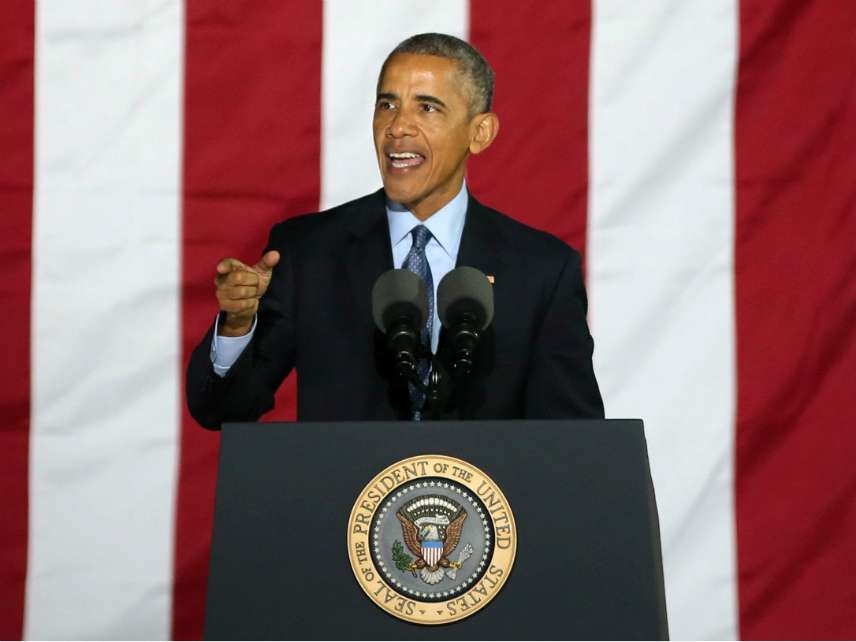Obama Endorses Medicare-for-All
While president, Obama was a single-payer critic. Out of office, he thinks it's the wave of the future.

While president, Barack Obama was a resolute critic of the idea that America was ready for single-payer healthcare. Free from the confines of his office, he's warmed to the idea.
In a well-publicized speech this afternoon, the former Commander in Chief praised the bright ideas of his party's progressive wing. "Democrats aren't just running on good old ideas like a higher minimum wage, they're running on good new ideas like Medicare-for-all," Obama said in his remarks, while also endorsing proposals like giving workers seats on corporate boards and reversing tax cuts.
Whatever one thinks of Medicare-for-all—also known as "single-payer"—it can hardly be called a "new" idea. If it were, Obama would not have had to spend so much time in office and on the campaign trail dismissing it as unworkable.
Here's then-Sen. Obama at a campaign event in Albuquerque, New Mexico, in 2008:
"If I were setting up a system from scratch, then I'd probably set up a single-payer system. The problem is we're not starting from scratch," said Obama. "We have a system that most people have become accustom to getting their health insurance from their employer…Making that transition in a rapid way would be very difficult."
Then there's the President Obama addressing the American Medical Association in 2009, while the legislation that would eventually become Obamacare was still working its way through Congress:
"I'll be honest. There are countries where a single-payer system may be working. But I believe—and I've even taken some flak from members of my own party for this belief—that it is important for us to build on our traditions here in the United States. So, when you hear the naysayers claim that I'm trying to bring about government-run health care, know this—they are not telling the truth."
There was also that time in August 2009, when Obama was asked at a town hall event in New Hampshire whether he supported single-payer healthcare:
"A single-payer plan would be a plan like Medicare for all, or the kind of plan that they have in Canada, where basically government is the only person—is the only entity that pays for all health care," said Obama, before stating bluntly. "I have not said that I was a single-payer supporter because, frankly, we historically have had a employer-based system in this country with private insurers, and for us to transition to a system like that I believe would be too disruptive."
This change in Obama's attitude shows a couple things that are relevant for our current debate about Medicare-for-all.
The first is that this is not a bright new idea suddenly gaining traction, but rather an age-old Democratic priority that has never come to fruition because actually doing it would be incredibly difficult and potentially disastrous. This is probably why Obama's enthusiasm for it has waxed and waned depending on his proximity to the White House. One can find examples of Obama throwing his support behind single-payer while still just a state senator from Illinois in 2003, before souring on it during a run for U.S. Senate a year later.
The feasibility—or lack thereof—can also be seen at the state level. In Vermont, a Democratic governor walked away from a single-payer plan after it became clear that paying for it would require the state to massively increase its income and business taxes.
The second point is that expansion of the government's role in health care will not satiate the demand for more government interventions later on. If anything, it just ratchets up the level of government intervention progressives will deem necessary, and that conservatives will eventually concede to be acceptable.
Obviously, Obamacare saw both the expansion of an old entitlement program (Medicaid) and the creation of new ones in the form of new health insurance subsidies. Now, the president who gave that legislation its name is arguing—less than two years after leaving office!—that we need to do much more. Conservatives, meanwhile, have made their peace with Obamacare, declining to repeal it when they had a chance, opting instead to preserve some of its key features.
Government's slow and seemingly inevitable creep into the health-care market doesn't eliminate the practical problems Democrats will face in attempting to implement Medicare-for-all. But if past is prologue, they will eventually have the political capital necessary to give it a go anyway.
Rent Free is a weekly newsletter from Christian Britschgi on urbanism and the fight for less regulation, more housing, more property rights, and more freedom in America's cities.


Show Comments (195)